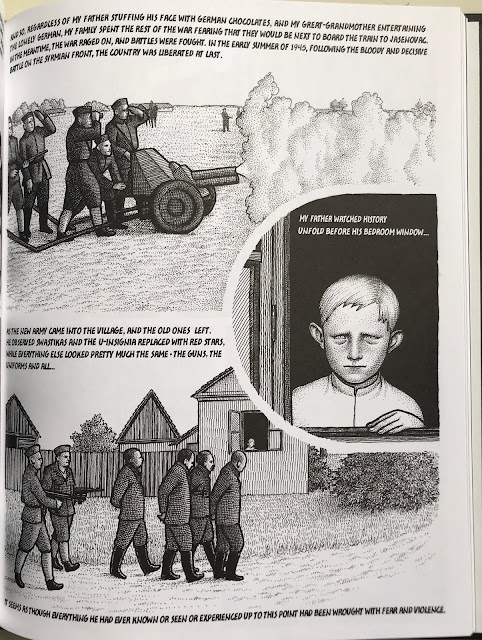Fatherland, by Nina Bunjevac
2015
I've heard Bunjevac's name come up for the last few years, especially since Bezimena came out. I actually ordered that book around New Years, but am still waiting on it. In the meantime, I found a copy of Fatherland and decided to give it a read.
This is a good book. It's not a fun book, it's a mature, personal, thoughtful book.
The idea behind this book is very strong. It's a history of Bunjevac's family, specifically her father. She lays out her own personal situation in the opening chapters of the book: she was born in Canada in the 70s to two immigrants from then-Yugoslavia, and was soon taken back to Yugoslavia with her mother to be raised with her mother's family. There, her father is either never spoken of or spoken badly of, until his reported death in a bomb-making accident.
From there, the book delves into what made her father who he was. Bunjevac herself doesn't remember him, she only knows him from pictures and stories. In order to understand him, she has to delve into the history of Yugoslavia and the Croatian and Serbian conflicts there. The book does some information dumps here and there, but for the most part keeps things personal, highlighting how the government regime changes and ethnic tensions affected her family, pushing and pulling them, and traumatizing them as well as most of the population.
The key with this is that it is personal. History can be a dry or abstract subject, but the history in this doesn't feel like that. Her father is directly affected by the tide of history and ends up in Canada, but he never lets go of his Serbian upbringing.
The most striking thing about the work is the art. It is very controlled yet manages not to be stiff. There is a photographic quality to it, but it's a byproduct of the rendering style as opposed to everything being rooted in photographs. Bunjevac certainly uses photos in places. The cover is a family photo, and in different places in the book she uses old photos to show snapshots of family memories. It's not an art style that I love, but it's impressive and quite unlike any artist working today.
Fatherland tells a story that I've never read: the life of a man leading up to him becoming a terrorist and losing his family. He's not a good guy, but he's not a bad guy in the book either. He's a troubled guy.
I go into books like this, true family stories mixed with real history, with trepidation, because they can be so heavy (for another example, Thi Bui's The Best We Could Do). This is heavy too. After reading this, I'm glad I read it, and it left a strong impression. It's really good. I have to go read something more escapist after this though.






No comments:
Post a Comment